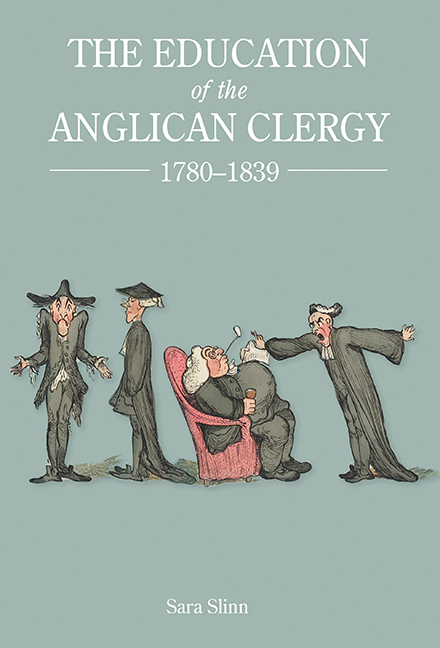Book contents
- Frontmatter
- Contents
- Illustrations
- Acknowledgements
- Abbreviations
- Introduction
- Part One Entrants to the Clerical Profession, 1780–1839
- Part Two Routes to Ordination
- 3 The Ordinand and the University
- 4 Literate Clergy and the Grammar Schools
- 5 Autodidacts, Tutors for Orders and Parish Clerical Seminaries
- Conclusion
- Appendix 1 Ordination Profiles of Bishops, 1780–1839
- Appendix 2 A Note on Methodology
- Bibliography
- Index
- Miscellaneous Endmatter
4 - Literate Clergy and the Grammar Schools
from Part Two - Routes to Ordination
Published online by Cambridge University Press: 30 August 2017
- Frontmatter
- Contents
- Illustrations
- Acknowledgements
- Abbreviations
- Introduction
- Part One Entrants to the Clerical Profession, 1780–1839
- Part Two Routes to Ordination
- 3 The Ordinand and the University
- 4 Literate Clergy and the Grammar Schools
- 5 Autodidacts, Tutors for Orders and Parish Clerical Seminaries
- Conclusion
- Appendix 1 Ordination Profiles of Bishops, 1780–1839
- Appendix 2 A Note on Methodology
- Bibliography
- Index
- Miscellaneous Endmatter
Summary
Grammar schools played an essential role in the education of clergy for the Established Church. A very large proportion of those sent to university had spent some part of their schooling at a grammar school, learning the Latin and Greek languages which formed the core of a ‘liberal’ education – and for some clergy, grammar schooling had not only introduced them to classical learning and created in them a desire for a ‘learned’ or literary occupation, but had also prepared them directly for the pulpit.
In this chapter, the role of such schools in the supply of non-graduate clergy is examined. Two aspects are considered: firstly, the advanced-level teaching in classics and divinity offered by specialist grammar schools, which fitted students to take orders directly without further tuition; secondly, those men who prepared for orders whilst employed as schoolmasters or assistants, some of whom received assistance with their studies from their employers. This basic division is sometimes blurred, since there were many students who were educated in those schools capable of preparing men directly for orders, who left at a younger age and supported themselves in teaching roles until they were old enough to take orders.
Advanced grammar schools and divinity schools: educating for orders
In the late eighteenth century, ordination-focused, tertiary education in schools was significant in two regions. In South Wales, the long-standing practice of preparing for orders at a school was gradually brought under the bishops’ oversight between the 1780s and 1820, so that specific schools were designated as suitable, syllabuses were provided, students were monitored and – at their most developed – financial assistance was given to students. In the far north-west of England, a fairly small region of Westmorland and its immediate bordering area also had a number of grammar schools which provided advanced education, whose students not only took orders in the local area but also found titles throughout the Northern Province, and sometimes beyond. Although the northern bishops took an interest in the schools, the relationship between schools and bishops remained much looser than in Wales.
The licensed grammar schools of St David's diocese
In the middle of the eighteenth century, most clergy prepared for orders with a good classical education at either an endowed or private grammar school, or at a dissenter-led academy open to pupils of all denominations.
- Type
- Chapter
- Information
- The Education of the Anglican Clergy, 1780–1839 , pp. 129 - 169Publisher: Boydell & BrewerPrint publication year: 2017

